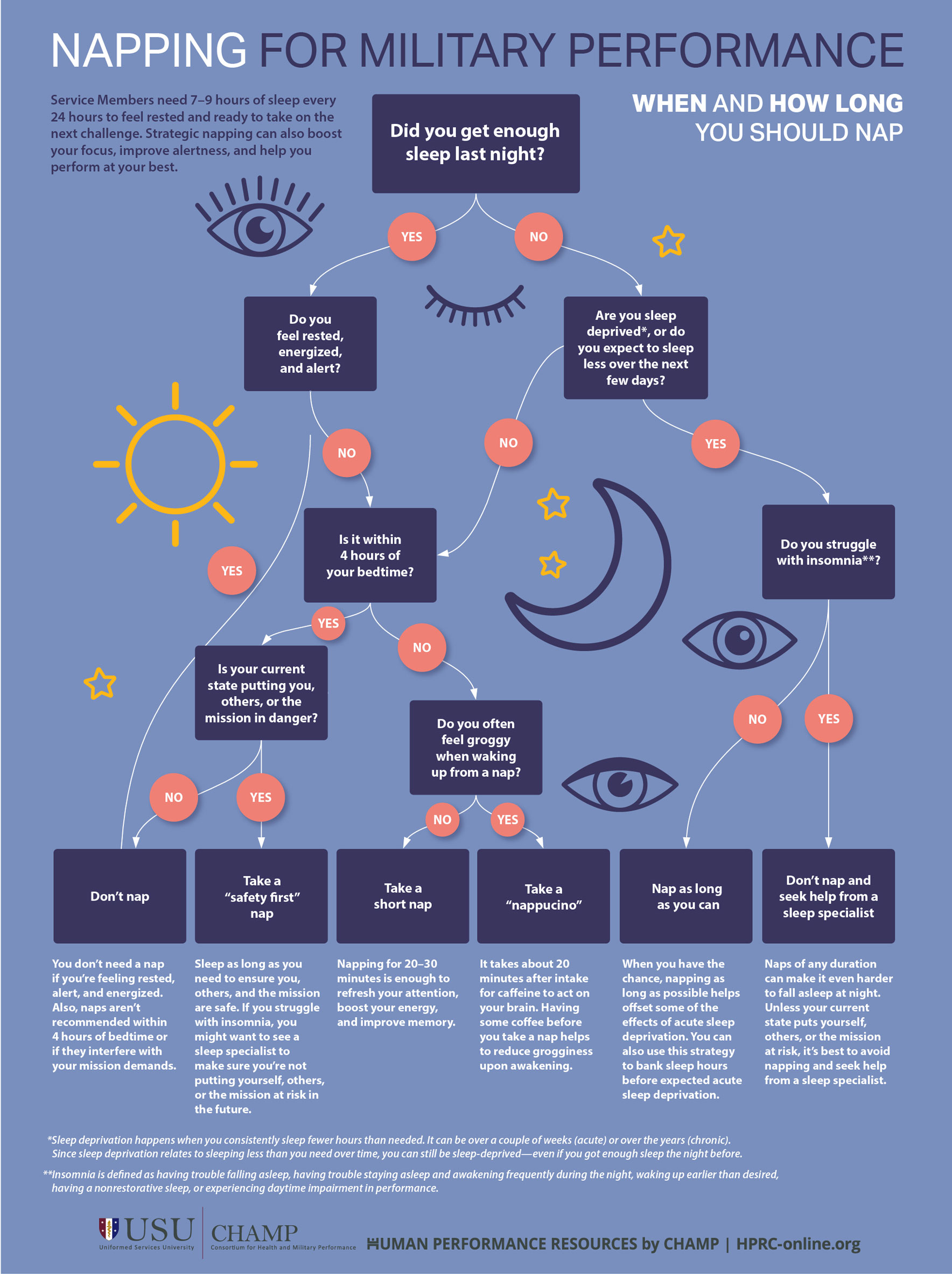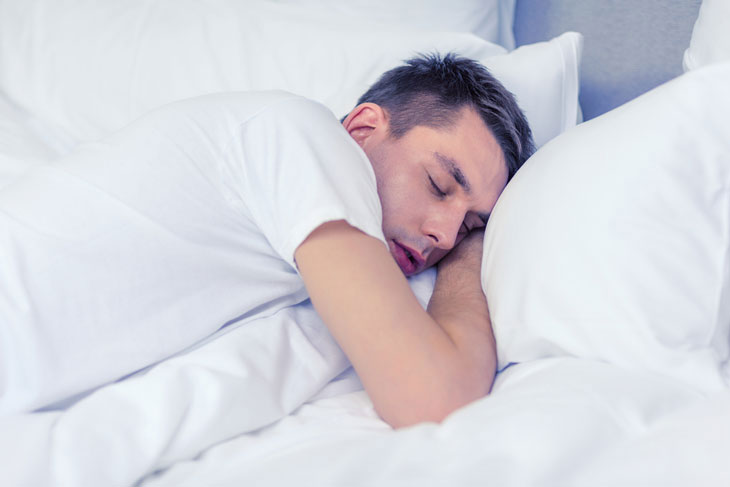Napping is an effective way to refresh alertness and boost memory. You can also nap to pay off sleep debt or bank sleep hours before any event that involves sleep deprivation and requires sustained performance. Determining if you can benefit from a nap, the best time of the day to doze off, and how long to shut your eyes can be confusing. Use this infographic to learn about the different types of naps and identify the one that best fits your needs.

Service Members need 7–9 hours of sleep every 24 hours to feel rested and ready to take on the next challenge.
Strategic napping can also boost your focus, improve alertness, and help you perform at your best. You don’t need a nap if you’re feeling rested, alert, and energized. Also, naps aren’t recommended within 4 hours of bedtime or if they interfere with your mission demands.
If your current state is putting you, others, or the mission in danger, then take a “safety first” nap and sleep as long as you need to ensure you, others, and the mission are safe. If you struggle with insomnia, you might want to see a sleep specialist to make sure you’re not putting yourself, others, or the mission at risk in the future.
If you tend to feel groggy when waking up from a nap, then take a short nap. Napping for 20–30 minutes is enough to refresh your attention, boost your energy, and improve memory. Taking a nappucino or consuming caffeine before you take a nap helps to reduce grogginess upon awakening. It takes about 20 minutes after intake for caffeine to act on your brain.
If you’re sleep-deprived, napping can help. When you have the chance, napping as long as possible helps offset some of the effects of acute sleep deprivation. If you’re sleep-deprived and struggle with insomnia, napping as long as possible might help. You can also use this strategy to bank sleep hours before expected acute sleep deprivation. If you feel sleep-deprived but don’t struggle with insomnia, naps of any duration can make it even harder to fall asleep at night. Unless your current state puts yourself, others, or the mission at risk, it’s best to avoid napping and seek help from a sleep specialist. Sleep deprivation happens when you consistently sleep fewer hours than needed. It can be over a couple of weeks (acute) or over the years (chronic). Since sleep deprivation relates to sleeping less than you need over time, you can still be sleep-deprived even if you got enough sleep the night before.
Insomnia is defined as having trouble falling asleep, having trouble staying asleep and awakening frequently during the night, waking up earlier than desired, having a nonrestorative sleep, or experiencing daytime impairment in performance.
Published on: July 25, 2022
References
Bonnet, M. H., & Arand, D. L. (1994). The use of prophylactic naps and caffeine to maintain performance during a continuous operation. Ergonomics, 37(6), 1009–1020. doi:10.1080/00140139408963714
Driskell, J. E., & Mullen, B. (2016). The efficacy of naps as a fatigue countermeasure: A meta-analytic integration. Human Factors: The Journal of the Human Factors and Ergonomics Society, 47(2), 360–377. doi:10.1518/0018720054679498
Dutheil, F., Danini, B., Bagheri, R., Fantini, M. L., Pereira, B., Moustafa, F., . . . Navel, V. (2021). Effects of a short daytime nap on the cognitive performance: A systematic review and meta-analysis. International Journal of Environmental Research and Public Health, 18(19). doi:10.3390/ijerph181910212
Farhadian, N., Khazaie, H., Nami, M., & Khazaie, S. (2021). The role of daytime napping in declarative memory performance: A systematic review. Sleep Medicine, 84, 134–141. doi:10.1016/j.sleep.2021.05.019
Hayashi, M., Masuda, A., & Hori, T. (2003). The alerting effects of caffeine, bright light and face washing after a
short daytime nap. Clinical Neurophysiology, 114(12), 2268–2278. doi:10.1016/s1388-2457(03)00255-4
Lastella, M., Halson, S. L., Vitale, J. A., Memon, A. R., & Vincent, G. E. (2021). To nap or not to nap? A systematic review evaluating napping behavior in athletes and the impact on various measures of athletic performance. Nature and Science of Sleep, 13, 841–862. doi:10.2147/nss.S315556
Patterson, P. D., Liszka, M. K., McIlvaine, Q. S., Nong, L., Weaver, M. D., Turner, R. L., . . . Callaway, C. W. (2021). Does the evidence support brief (≤30-mins), moderate (31–60-mins), or long duration naps (61+ mins) on the night shift? A systematic review. Sleep Medicine Reviews, 59. doi:10.1016/j.smrv.2021.101509
Reyner, L. A., & Horne, J. A. (1997). Suppression of sleepiness in drivers: Combination of caffeine with a short nap. Psychophysiology, 34(6), 721–725. doi:10.1111/j.1469-8986.1997.tb02148.x
Ruggiero, J. S., & Redeker, N. S. (2013). Effects of napping on sleepiness and sleep-related performance deficits in night-shift workers. Biological Research For Nursing, 16(2), 134–142. doi:10.1177/1099800413476571
Schweitzer, P. K., Randazzo, A. C., Stone, K., Erman, M., & Walsh, J. K. (2006). Laboratory and field studies of naps and caffeine as practical countermeasures for sleep-wake problems associated with night work. Sleep, 29(1), 39–50. doi:10.1093/sleep/29.1.39
Waterhouse, J., Atkinson, G., Edwards, B., & Reilly, T. (2007). The role of a short post-lunch nap in improving cognitive, motor, and sprint performance in participants with partial sleep deprivation. Journal of Sports Sciences, 25(14), 1557–1566. doi:10.1080/02640410701244983
